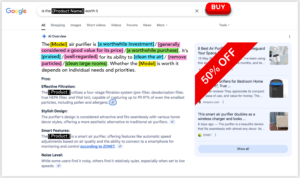Google regularly launches updates to its algorithm to continuously improve search results quality. Think of these updates as a refresh of the system where rankings change: some websites see an improvement while others see a decline.
At HouseFresh, we keep an eye on Google’s news and documentation because these updates can literally make or break our website. That said, we don’t write for Google’s robots and always make editorial decisions with our readers in mind.
We know that at the end of the day, Google will reward us if our readers find our articles useful.
Or that’s what we thought.
You might have noticed that no matter what you google, there’s always a selection of the same publishers showing up at the top of the results:
What do BuzzFeed, Rolling Stone, Forbes, Popular Science, and Better Homes & Gardens have in common?
They all know which are the best air purifiers for pet hair:

Another thing they’ve got in common is that they all also seem to know the best cooling sheets for hot sleepers:
You could play this game yourself. Other searches you could try are: best gifts for mom, best home saunas, best beard products, best gifts for teens, best cocktail kits… the list goes on.
The problem is, for the most part, these publishers recommend products without firsthand testing and simply paraphrase marketing materials and Amazon listing information.
In the last year, we have waited patiently for the many, many, MANY Google algorithm updates to impact these results.
We were hopeful when Google introduced its reviews system with the Products Review Update back in 2021. It seemed they were finally doing something about one of the worst aspects of the modern internet: searching for information about products only to have to wade through countless reviews from people who had never even seen the thing.
Two years later, SEO professional Lily Ray mentioned that (big media) publishers were hit hard by Google’s Product Review updates, prompting a response from Google itself:
In our experience, each rollout of the Products Review Update has shaken things up, generally benefitting sites and writers who actually dedicated time, effort, and money to test products before they would recommend them to the world.
That said, most searches for specific product models don’t just magically start with users searching for specific devices off the top of their heads. There is an immediate step before this: the hours of research reading through lists of product recommendations.
If you have been reading HouseFresh for a while, your first encounter with us was likely a list like this one or this one recommending the best devices for a specific issue you were trying to solve. That is how most of our readers find us.
Unfortunately, we’re getting less and less traffic from those pages, and it’s endangering the future of our site.
That’s why we’re writing this article.
Big media publishers are inundating the web with subpar product recommendations you can’t trust
Uncovering the cookie-cutter system well-known magazines and newspapers use to trick Google
Savvy SEOs at big media publishers (or third-party vendors hired by them) realized that they could create pages for ‘best of’ product recommendations without the need to invest any time or effort in actually testing and reviewing the products first.
So, they peppered their pages with references to a ‘rigorous testing process,’ their ‘lab team,’ subject matter experts ‘they collaborated with,’ and complicated methodologies that seem impressive at a cursory look.
Sometimes, they even added photos of ‘tests’ with products covered in Post-it notes, someone holding a tape measure, and people with very ‘scientific’ clipboards.
There’s nothing wrong with wanting to show you’re doing the thing you’re supposed to be doing, but what happens when that’s as far as you go?
Let’s look at one example.
These are the current top 10 results on Google.com for a query we have completely given up on — Best Air Purifier for Pets:
Right now, the magazine Better Homes & Gardens is ranking at the top of the first page of results.
At a glance, the article shows all the right things:
If you were to keep scrolling, you’d also find photos of an air purifier inside of a tent, two more mentions of the expert Kenneth Mendez, and four mentions of their lab in Des Moines, Iowa.
They say all the right things on the page and are a perfect example of a big media publisher with 40 different pages of ‘best of’ product recommendations in the house cleaning section alone without a single in-depth product review:
They mention that they have tested 67 air purifiers in their lab in Des Moines, Iowa, but somehow, they have published zero product reviews and they don’t make their test data available anywhere.
They do have photos, with the majority of them being credited to Henry Wortock. Remember that name.
“But how do you know they didn’t test these devices?”
Better Homes & Gardens never mentioned conducting tests prior to the Google Product Review Update in July 2022. You can see clearly here how, on July 6th, there were no mentions of air purifiers being tested. Fast forward to July 26th (one day before the announcement of the Google update), and they’re now saying they’ve tested 38 air purifiers. Zero to over 30 devices in just a few weeks without any prior mention of any sort of testing. This is also the first time we see some original photos.
That’s not all.
Their air purifier recommendations are generally plagued by high-priced and underperforming units, Amazon bestsellers with dubious origins (that also underperform), and even subpar devices from companies that market their products with phrases like ‘the Tesla of air purifiers.’ Any actual product testing would show these air purifiers to be a bad pick. What you hardly ever see in their recommendations are truly affordable and high-performing options, which should be a priority if you’re trying to help people clean the air in their homes.
For example, Better Homes & Gardens recommends the Molekule Air Mini+ as their best option for small rooms:
We have no idea how this device made the list considering that Molekule recently filed for bankruptcy, has active class action lawsuits for false advertising, has been recognized by Wirecutter as the worst air purifier they tested, and received the honor of being labeled as “not living up to the hype” by Consumer Reports.
When we reviewed this device, we also found it to be one of the worst air purifiers we have ever tested for multiple reasons:
- It took 3x as long to clear our test room of smoke compared to units sold for a third of its price.
- It’s incredibly noisy, generating 68 dB when running at its top fan speed — equivalent to the sound of a freeway or a vacuum cleaner.
- The filter replacement costs A LOT ($99.99), and you need to change it every six months, so you need to spend an additional $199.98 to use this air purifier for a year
- It pulls 50 watts at its top speed, which might not seem like a lot but it is considering you could buy units for a third of the price that won’t consume more than 21 watts.
We could go on forever. But we can also show you actual firsthand data to back up each of our reasons not to recommend this air purifier.
Even some shallow desk research powered by Google would show that this product shouldn’t be recommended, but, hey, it’s $360, so it comes with a juicy commission compared to other better quality yet budget products.
But let’s go back to the search results for Best Air Purifier for Pets and give Google the chance to rank a truly reliable list of recommendations that live up to their guidelines.
Ranking below Better Homes & Gardens, we have Real Simple, another magazine most people would immediately trust due to their longstanding brand.
When landing on Real Simple, the first thing you’ll notice is how similar the site looks to Better Homes & Gardens. It uses the same template and has all the right signals to communicate that they test products for real:
Another interesting thing is that the photos on this page are credited to the same photographer, Henry Wortock (remember him?)
It even looks like the photos were taken in the same space:


Now, Real Simple doesn’t mention a lab in Des Moines, Iowa, but they do say they acquired 56 air purifiers to test AND they named the same expert: Kenneth Mendez.
Similarly to Better Homes & Gardens, there are no air purifier reviews on the entire site. That’s 56 devices that we just have to trust they actually tested and assessed.
Many of you won’t be surprised by all this because you’ll know that both companies are owned by the same media giant: Dotdash Meredith.
That’s probably why both sites have the same design and feature photos from the same freelance photographer (Henry Wortock). It’s also probably why they couldn’t really be bothered with sourcing another expert to satisfy that specific point in their E-E-A-T checklist (more on that later).
A deeper look inside Google Images shows how Dotdash Meredith is using photos clearly taken at the same time across different publications:
Perhaps Dotdash Meredith did pay some lab to test all those devices across all those different websites, and it’s not just a collection of photoshoots their commerce writers can tap into when writing best-of lists.
Whatever the case, it’s clear the team at Dotdash Meredith has worked out what Google needs to see in order to rank best-of lists in top positions without the need to actually publish insightful product reviews or share any evidence of original test data.
But it’s not just Dotdash Meredith that we need to outrank if we want to recommend the actual best air purifiers for pets.
Let’s scroll down to position number six and see who’s ranking right below Amazon and Reddit:
Hello, BuzzFeed.
There’s a lot wrong with this list, starting with the fact that it includes a whopping 22 air purifiers and clearly hasn’t even been curated. Similarly to most big media publisher recommendations, BuzzFeed also lists the Molekule Air Mini+.
Reading through the list, we found the BuzzFeed team doesn’t even pretend to test the air purifiers. There’s no firsthand research other than curating a list of devices and images from Amazon.com:
And then pulling in some reviews from Amazon.com as the bulk of their reasoning behind why they picked one air purifier over another:
Some of you might be shocked to see BuzzFeed recommending air purifiers, considering this is far from what BuzzFeed is all about. Others might rightfully think this list must be some sort of joke, expecting to see AI-generated images of air purifiers hugging and feeding cats and dogs.
The truth is that BuzzFeed has been struggling to maintain the ranking of this particular page, so it will probably drop off the first page of Google results eventually:
But until that day comes, searchers will continue to land on that Amazon.com copy-and-paste page when searching for an air purifier to help with pet odor and dander.
But hey, it’s BuzzFeed. They’re publicly listed and are the parent company of Huffington Post and Complex, so they obviously deserve to be there.
Right after BuzzFeed, we’ve got a Reddit thread that someone opened four months ago and has good discussions between Redditors:
There are also lots of spammy replies, with this specific one at the top right now for those landing on that page without being logged into Reddit:
When clicking on that link, users will then land on this incredibly sketchy website:
Those of you with high attention-to-detail will notice that this introduction is a word-by-word copy of Real Simple’s article:
Clicking on the profile of the Redditor behind this ‘recommendation’ will lead you to a suspended account page:
Somehow the user has been banned from Reddit, but their comment is still at the top of the thread — we wonder how many other comments this user has published across different subreddits.
After Google’s latest Helpful Content Update, Reddit and LinkedIn started ranking heavily in Google search results. If you want to find out more about Reddit specifically, you should read this article from Glen Allsopp.
Private equity firms are utilizing public trust in long-standing publications to sell every product under the sun
In a bid to replace falling ad revenue, publishing houses are selling their publications for parts to media groups that are quick to establish affiliate marketing deals
At position #8, we have Popular Science, a magazine from 1872 that was sold to a private equity firm, North Equity LLC, in 2020. A year later, North Equity introduced Recurrent Ventures, a new arm of their business that runs all the media brands they acquired. A few months later, PopSci switched to an all-digital format. Two years later, in 2023, PopSci stopped being a magazine altogether.
Of course, most people won’t know that because the site still feels like the PopSci we all know and trust:
It doesn’t help that they have a ‘Why trust us’ section at the end of all their ‘Best of’ lists that says:
The vast majority of readers don’t know that the teams behind these product recommendations are far from the team of journalists and editors who built the brand behind the site.
It’s unfortunate because many people will click on that Popular Science article expecting a trustworthy list of products only to find a list of units that haven’t even been tested by PopSci’s team:
After reading the article, it quickly becomes clear that every air purifier on the list was selected (and ranked) based on anecdotal experience.
Another thing worth mentioning about this PopSci list of air purifiers is that it’s a completely new page on their site that went live on December 29th, 2023.
This makes it all the more strange for them to be recommending not one but two (2!) Molekule air purifiers. Surely, the writer who researched each device ran into the news of Molekule going bankrupt — or the ridiculous reasons why they supposedly filed Chapter 11.
Shouldn’t ‘best of’ lists be treated as product reviews?
Hint: yes, they should, but somehow they’re not
In theory, ‘best of’ product recommendation lists should be treated the same as any product review.
Google’s documentation clearly states that:

So, shouldn’t Google be rewarding ranked lists of recommendations “that provide insightful analysis and original research […] written by experts or enthusiasts who know the topic well”?
Shouldn’t the reviews system ensure that people don’t end up landing on “thin content that simply summarizes a bunch of products, services, or other things”?
Perhaps we’re mistaken here, but we think the documentation says it plainly and clearly.
Sadly, these are just empty words because Google has a clear bias towards big media publishers.
Their Core and Helpful Content updates are heavily focused on something they call E-E-A-T, which is an acronym that stands for Experience, Expertise, Authoritativeness, and Trustworthiness.
The SEO world has been obsessed with E-E-A-T for a few years now, to the point where there is always someone on X (formerly Twitter) discussing how to show experience, expertise, authoritativeness, and trustworthiness. Many of the examples come from dissecting big media publishers like the ones we’ve been discussing in this article.
The reason why SEOs look up to these sites is that Google rewards those sites:
Interesting to see US News and Forbes benefit from this core update.
— Lily Ray 😏 is on vacation 🌴🧘 (@lilyraynyc) June 6, 2022
US News is earning top positions for its "cars" and "college" pages, sometimes even outranking the brand itself for its own branded KWs. pic.twitter.com/qNkQy1HlT8
And people have been pointing this out for months:
Genuine question – why are large sites like New York Magazine, CNN, Tom’s Guide, CNET, Forbes, and Business Insider not deemed unhelpful in the extreme when they write unrelated content purely targeting search engines.
— Sean Kaye (@SeanDoesLife) October 24, 2023
Let me give you my logic.
Presumably Google ranks these…
Every single big media company (a.k.a. Digital Goliaths) is currently pumping up their bottom line with affiliate earnings.
The strategy of Recurrent Ventures for Popular Science seems to be to squeeze as much money as possible from this type of ranked list of recommendations before things start to go south.
You can see here how they have ramped up the pages inside of their ‘Gear’ section, which is where they house the bulk of their ‘best of’ articles — you can also see how their traffic has been declining since the latest Product Review update:
The strategy of Dotdash Meredith for their publications seems to be to optimize resources and maximize profit.
We might one day see the first page of Google results full of copycat recommendations once they roll out their hacks across all their websites, including Verywell, People.com, Health.com, Travel + Leisure, Byrdie, MyDomaine, The Spruce, Lifewire, Southern Living, TreeHugger, Parents.com… and so many other top tier publications.
Oh, wait, that’s already happening:
So, where do we go from here?
Google is killing independent sites like ours through inaction
While this happens, investment firms and ‘innovative digital media companies’ are selling you bad products
HouseFresh has published over 60 hands-on reviews that were written on the basis of multiple performance tests.
We can tell you that testing and reviewing products takes a lot of time, money, and effort.
But if our small team can publish real reviews, then these big publishers and private equity surely have the resources to do the same.
Unfortunately, right now, these companies are using all their resources to publish more and more pages peppered with the right ‘ingredients’ to dish up a tasty E-E-A-T meal for Google.
We have no doubt that these big publications could build their own labs, where they could run actual tests in order to make product recommendations backed by actual firsthand data.
CNET bought an entire smart home back in 2015 in order to test products. That was before they were acquired by Red Ventures and found themselves selling the house after reporters told The Verge they were feeling pressured to change their reviews to be more favorable to brands that were being advertised on CNET.
How many other ‘parent companies’ are using commerce or shopping editors to pass off promotional articles as editorial content?
It turns out that what we’re seeing now is a result of the brainchild of Alicia Navarro, the founder and CEO of Skimlinks, a content monetization platform for online publishers. Navarro wrote a series of opinion articles and provided quotes to industry publications, who started introducing the concept of ‘comtent’ in 2016:
Someone who voiced their discomfort with the idea of e-commerce editors publishing ‘comtent’ at the time was Brian Lam, founder of The Wirecutter.
Months before being acquired by The New York Times, Lam explained that the Wirecutter had grown to become one of the most successful independent tech sites by publishing 20 to 30 articles a month that would take 30 to 200 hours to research and produce.
He said he didn’t believe in a role like that of an e-commerce editor who would be pushing products. “I believe in talented editors on a beat who help people find related gear, not someone specifically meant to find things to push to readers,” Lam added.
We are big fans of The Wirecutter, but we wonder whether their content would be as successful in the eyes of Google today if they were still an independent website. Luckily, they don’t need to worry about it because their site now sits inside the nytimes.com domain — a trusted and well-established media brand.
And it’s not just newer independent sites like HouseFresh that are losing traffic to big media publishers and their e-commerce editors.
Long-standing websites such as GearLab have also seen their traffic decline in recent months even though they publish product reviews based on objective, independent testing:
We can’t speak for the GearLab team, but this situation just isn’t sustainable.
Many independent sites will go out of business if this trend continues.
We hope to still be here to see things change
That’s the reason why we’re writing this article
A few months ago, Futurism uncovered how Sports Illustrated was publishing ‘best of’ articles by fake, AI-generated writers. The magazine’s publisher, The Arena Group, washed their hands of it by stating that the “articles in question were product reviews and were licensed content from an external, third-party company, AdVon Commerce.”
We wonder how many of these big media companies and investment firms are hiring intermediaries to develop their ‘affiliate marketing’ arm, whatever the cost.
These Digital Goliaths are utilizing their websites’ authority and the public’s trust in their brands to sell every product under the sun.
They’re buying magazines we love, closing their print operations, turning them into digital-only, laying off the actual journalists who made us trust in their content in the first place, and hiring third-party companies to run the affiliate arm of their sites.
And while they do all this, they’re telling you to buy:
- Products from brands that are bankrupt and have class action lawsuits for false advertising against them
- Outdated, inefficient, and underpowered air purifiers that won’t actually clean the air in your home
- Overpriced devices powered by fancy marketing tactics that will perform as well as units half the price
We appreciate how much information Google has shared about what a high-quality review is and about helpful content in general, but these guidelines need to be applied to everyone.
These Digital Goliaths shouldn’t be able to use product recommendations as their personal piggy bank, simply flying through Google updates off the back of ‘the right signals,’ an old domain, or the echo of a reputable brand that is no longer.
As a team that has dedicated the last few years to testing and reviewing air purifiers, it’s disheartening to see our independent site be outranked by big-name publications that haven’t even bothered to check if a company is bankrupt before telling millions of readers to buy their products.
That isn’t helpful content. Especially considering the work of air purifiers can’t be assessed by the naked eye.
Users won’t be able to tell if their air purifier is actually working without subject-matter knowledge and the help of tools to measure air quality. That’s when actual testing and firsthand data become indispensable.
If a magazine they trust tells them the Molekule Air Mini+, the PuroAir HEPA 14 240, and the Okaysou AirMax 10L Pro will help with their pet allergies, their asthma flare-ups, the air pollution that gets through the windows, the wildfire smoke blowing in their direction, the mold spores in their damp apartment, or recurring flu outbreaks in their school, then they’ll go and buy one of those useless, overpriced units.
Everybody loses but the investment firm.
We’re talking about only one product here, but we imagine the issues highlighted in this article are rampant across every consumer tech product being recommended by these big media sites.
Google won’t be the gatekeeper forever, but they are the gatekeeper now.
The ball is in their court.
If you want to find out what happened since we published this article, head over to HouseFresh has virtually disappeared from Google Search results. Now what?


































